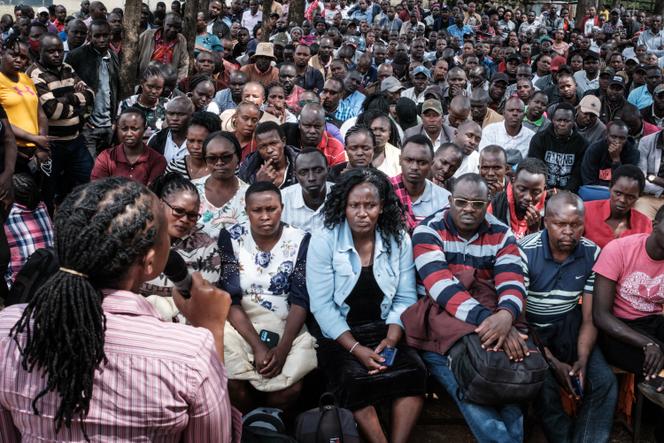
At 60 years old, Beatrice Atieno had never participated in a demonstration before. But when the citizens’ movement Njaa Revolution ("hunger revolution" in Swahili) organized a giant march in downtown Nairobi in July, this single mother didn’t hesitate to join the crowd, holding a sign reading "No food, no elections!" She will still go to the polls for the presidential elections on Tuesday, August 9, for lack of anything better to do. She will turn in an "Odinga" ballot, she confided.
Every day, Beatrice walks from her slum in Mathare, in the Kenyan capital, to the nearby Eastleigh district, a bustling commercial hub with Somali influences. For seven hours, she washes, wrings and folds clothes in one of the many artisanal laundries. Her pay depends on the owner’s mood. "Usually he gives me 100 shillings [82 euro cents], on good days it’s 200 shillings, on bad days it’s 75," she said. Hardly enough to buy food when she gets home.
To keep going, "sometimes I just buy a lemon, boil it in water and drink it. It gives you energy and fills you up," said Beatrice in front of two of her colleagues, who agreed with her and said they use the same method. "In 2007, there was violence, but at least the price of food was affordable, we didn’t have to skip meals," she recalled, referring to the post-election violence that left more than a thousand people dead in Kenya, including 112 in Mathare.
'How much is a kidney worth?'
"There was a before Covid-19 and after Covid-19," said Ken Gichanga, an economist with Mentoria Economics. "The distress of so many Kenyans has refocused the presidential election on the economy. The political class has had no choice but to adapt." Until now, elections have been based primarily on community and ethnic issues. Now the social crisis is the focus. "This is ultimately a good sign for democracy," said Ken Gichanga.
According to the World Bank, 33% of Kenya’s population lives below the poverty line. The Covid-19 pandemic has driven 2 million Kenyans into poverty and doubled the country’s unemployment rate (10.4%) in the process. In July, inflation climbed to 8.3% compared to the same period last year. A five-year high. The prices of flour, gasoline, cooking oil and other basic products have almost doubled in a year, trapping the working class that was already weakened by the Covid-19 crisis.
The situation is so dire that the question "how much is a kidney worth?" is now one of the most frequently asked questions at the Kenyatta National Hospital by email. The hospital, one of the biggest in the country, had to clarify on its Facebook account that the sale of organs is illegal.
You have 52.38% of this article left to read. The rest is for subscribers only.